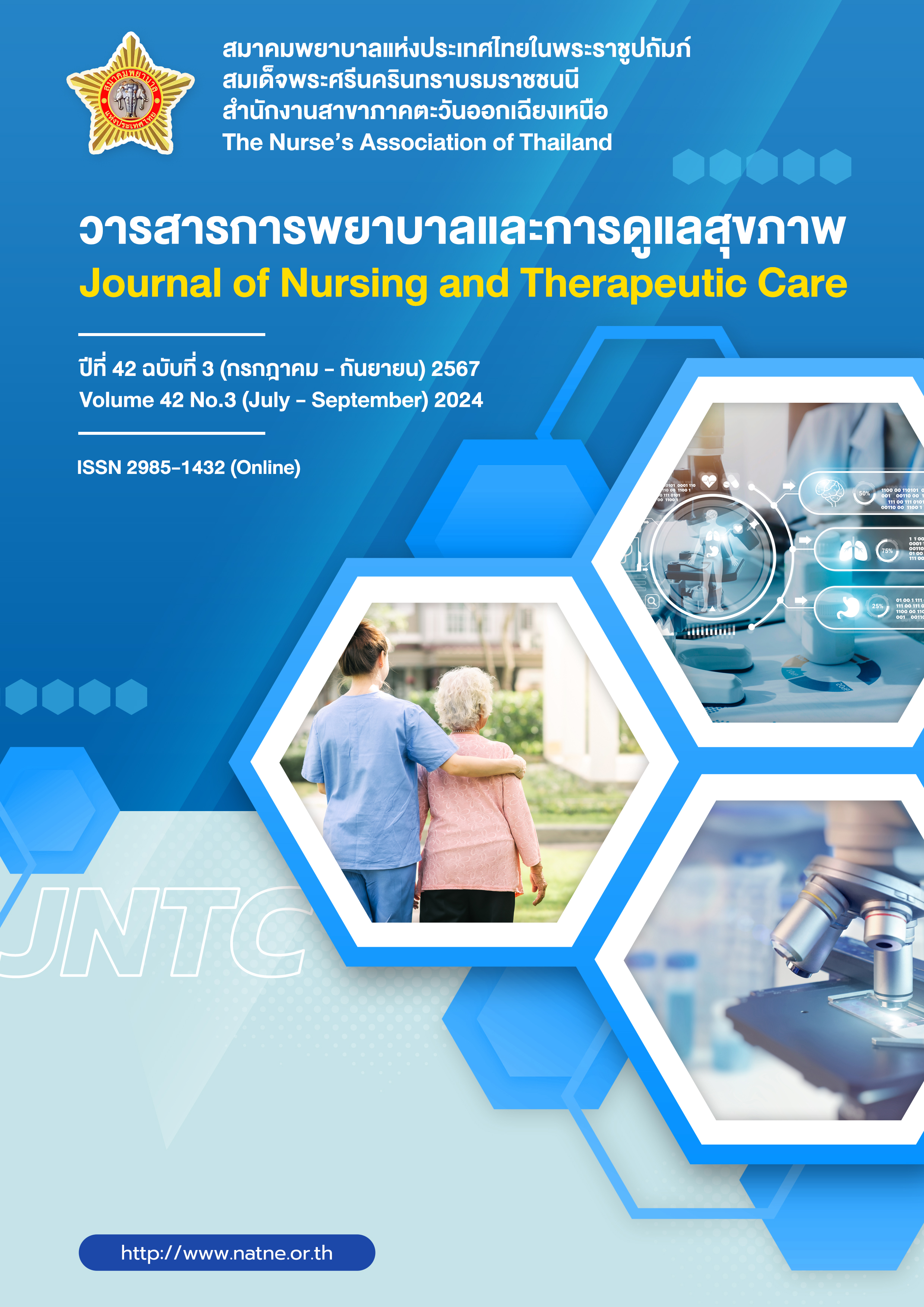ความรู้ แรงจูงใจ ปัญหาและความต้องการในการดูแลของผู้ดูแลเด็กสมองพิการในสถานการณ์ปัจจุบัน: การวิจัยผสมผสานแบบรองรับภายใน
คำสำคัญ:
สมองพิการ, เด็ก, ภาระของผู้ดูแลบทคัดย่อ
การศึกษาผสมผสานแบบรองรับภายในนี้มีวัตถุประสงค์เพื่อ ศึกษาความรู้ แรงจูงใจ ปัญหาที่เกี่ยวข้องกับกิจกรรมการดูแลและความต้องการในการดูแลของผู้ดูแลเด็กสมองพิการ ผู้เข้าร่วมวิจัยเป็นผู้ดูแลเด็กสมองพิการจำนวน 29 คนที่ได้รับการรักษา ที่โรงพยาบาลระดับตติยภูมิ เครื่องมือการวิจัยประกอบด้วยแบบสอบถามข้อมูลส่วนบุคคล แบบสอบถามความรู้ แรงจูงใจ การรับรู้ และสถานะสุขภาพของผู้ดูแล และความพึงพอใจของผู้ดูแลในกิจกรรมการดูแลและการปฏิบัติ และสถานะสุขภาพของ เด็กสมองพิการ รวมถึงคำถามปลายเปิดในการดูแลเด็กสมองพิการ ความเที่ยงตรงและความน่าเชื่อถือของเครื่องมืออยู่ที่ 0.67-1.00 และ 0.78-0.81 ตามลำดับ วิเคราะห์ข้อมูลเชิงปริมาณโดยใช้สถิติพรรณนา ข้อมูลเชิงคุณภาพใช้การวิเคราะห์เนื้อหาสร้างธีม เพื่อสนับสนุนผลการวิจัยเชิงปริมาณให้ชัดเจนมากยิ่งขึ้น
ผลการศึกษาพบว่าผู้ดูแลมีความรู้ในกิจกรรมการดูแลชีวิตประจำวันของเด็กสมองพิการน้อยที่สุด โดยเฉพาะการกำจัดเสมหะและสาเหตุของโรค แรงจูงใจในการดูแลเด็กสมองพิการอยู่ในระดับสูง การรับรู้เกี่ยวกับอุปกรณ์ เครื่องมือ และงบประมาณ ที่จำเป็นในการดูแลอยู่ในระดับสูง นอกจากนี้ยังรับรู้ในระดับสูงว่าโรคของเด็กสมองพิการสามารถก่อให้เกิดผลกระทบกับคุณภาพชีวิตทางกายและจิตใจของผู้ดูแล กิจกรรมการดูแลเด็กที่ปฏิบัติเป็นบางครั้งได้แก่ การให้ดื่มน้ำสะอาดอย่างน้อย 6-8 แก้วต่อวัน การฝึกการขับถ่าย การลืมให้ยาหรือให้ยาทันทีเมื่อนึกได้ ไม่พาไปพบแพทย์ก่อนนัดเมื่อมีภาวะแทรกซ้อนจากยา ความพึงพอใจต่อผลลัพธ์การดูแลเกี่ยวกับพัฒนาการอยู่ในระดับปานกลาง อย่างไรก็ตาม ความพึงพอใจของผู้ดูแลในการดูแลเด็กสมองพิการอยู่ในระดับสูง ผลการสัมภาษณ์เชิงลึกสามารถจัดหมวดหมู่เป็นสี่กลุ่มได้แก่ ปัญหาในการดูแลเด็กสมองพิการ ความคาดหวังและ ความต้องการในการดูแลเด็กสมองพิการ ปัจจัยที่สนับสนุนการดูแล และแนวทางในการดูแลเด็กสมองพิการในอนาคต พยาบาลสามารถใช้ผลการศึกษานี้เพื่อพัฒนามาตรฐานการดูแลเด็กสมองพิการที่สอดคล้องกับความต้องการของเด็กสมองพิการและผู้ดูแลได้
Downloads
เอกสารอ้างอิง
Chaichanasang T, Thalakarm E, Launkaw M, Phuangsriken S, Posri A, Jantanarm W, et al. The development model for cerebral palsy caregivers. Regional Health Promotion Center 9 Journal. 2022;16(3):957-68. (in Thai)
Department of Pediatrics. Medical records and annual statistic 2555-2562. Department of Pediatrics: Khon Kaen Hospital; 2023. (in Thai)
Nketsia W, Edusei A, Hammond C, Dogbe JA, Afriyie SA. Opoku MP, et al. Experiences of primary caregivers of children with cerebral palsy across the trajectory of diagnosis in Ghana. Afr J Disabil. 2019;8(1):1-11.
Boonyakarn T, Saksiriphol D, Pothisaan P. The development of the intervention tools for enhancing self-help skills for children with cerebral palsy under the learning experience management with parental involvement model. Research and Development Journal Suan Sunandha Rajabhat University. 2016;8(3):118-33. (in Thai)
Panyatanakun N, Terathongkum S, Sakulhongsopon S. Factors associated with caregiving behavior of family caregivers of children with cerebral palsy in Bangkok. Thai Journal of Nursing and Midwifery Practice. 2019;6(1):5-18. (in Thai)
Sanit D, Nookong A, Prasopkittikun T, Srichantaranit A. Effect of a supportive-educative nursing program on caring behaviors among caregivers of children with cerebral palsy. Kuakarun Journal of Nursing. 2015;22(1):60-81. (in Thai)
Magugu N, Verusia C. Caregiver satisfaction with a multidisciplinary community-based rehabilitation programme for children with cerebral palsy in South Africa. S Afr Fam Pract. 2017;59(1):35–40.
Wannasuntad S, Kanchanaaree S. Intervention for training/empowering caregivers of cerebral palsy children: A scoping review. Journal of Health and Nursing Research. 2019;35(3):235-49. (in Thai)
Madzhie M, Mphephu KE, Baloyi V, Chueng M. The challenges experienced by mothers with children suffering from cerebral palsy: a study conducted at Mutale municipality, South Africa. Cogent Psychol. 2022;9(1):2043020.
Martrakul M, Mongkhonittivech N. Situation analysis of care by volunteers for elders with chronic diseases in Mae-Ngoen municipality, Chiangmai Sean District, Chiangmai Rai Province Journal of Nursing Science & Health. 2018;41(2):69-77. (In Thai)
Cochran W.G. Sampling Techniques. 3rd ed. Canada: John Wiley & Sons; 1977.
Srisatidnarakul B. Development and validation of research instruments: Psychometric properties. Bangkok: Chulalongkorn University Printing House; 2012. (In Thai)
Weir K, Bell K, Caristo F, War R, Davies P, Fahey M, et al. Reported eating ability of young children with cerebral palsy: is there an association with gross motor function Arch. Phys Med Rehabil. 2013;94:(3):495-502.
Aisen ML, Kerkovich D, Mast J, Mulroy S, Wren T, Kay RM, et al. cerebral palsy: Clinical care and neurological rehabilitation. Lancet Neurol. 2011;10(9):844–52.
Joana MM, Luís OS. Feeding a child with cerebral palsy: parents’ difficulties. Jour of Nur Referência. 2016;6(11):11-9.
Maggie DD, Chang YJ, Nguyen TTB. Caregivers' experiences of having a child with cerebral palsy : a meta-synthesis. meta-synthesis. J Pediatr Nurs. 2023;73:157–68.
Mohammed R, Eloreidi D, Kehyayan V, Kalu F, Thornton L. Needs of caregivers of children with cerebral palsy: A literature review. J Nurs Educ Pract. 2021;11(9):23-8.
Gulati S, Sondhi V. Cerebral palsy: an overview. Indian J Pediatr. 2018;85(11):1006-16.
Patel DR, Neelakantan M, Pandher K, Merrick J. Cerebral palsy in children: a clinical overview. Transl Pediatr. 2020;9(Suppl. 1):125-35.
Schaible B, Colquitt G, Caciula MC, Carnes A, Li L, Moreau N. Comparing impact on the family and insurance coverage in children with cerebral palsy and children with another special healthcare need. Child Care Health Dev. 2018;44(3):370–7.
Thalakarm E, Chaichanasang T. Effects a self – help group on quality of life of caregivers of child with cerebral palsy. Journal of nursing science & health. 2020;43(4):147-79. (in Thai)
Na-Rungsri K. Primary caregivers’ voice: experience of food preparing and feeding children with cerebral palsy Thammasat Medical Journal. 2014;14(4):589-97. (in Thai)
Hockenberry MJ, Wilson D, Rogers C. Wong’s nursing care of infant and children.11th ed. St. Louis: Missouri; 2019.
Mlinda SJ, Leyna GH, Massawe A. The effect of a practical nutrition education programme on feeding skills of caregivers of children with cerebral palsy at Muhimbili National Hospital, in Tanzania. John Wiley & Sons Ltd. 2018;44(3):452-61.
Thongsard J, Sanjamsai S. The effects of cognitive behavior counseling program on compassion fatigue, secondary trauma and burnout in caregivers of children with intellectual disabilities in the home for protection and development for persons with disabilities. Journal of the Psychiatric Association of Thailand. 2023;68(4):371-9. (in Thai)
Hongrapipat J. A comparative study of quality of life (QOL) and mental health of caregiver with cerebral palsy child with healthy control. Medical Journal of Srisaket Surin Buriram Hospital. 2014;29(3):140-8. (in Thai)
ดาวน์โหลด
เผยแพร่แล้ว
รูปแบบการอ้างอิง
ฉบับ
ประเภทบทความ
สัญญาอนุญาต
ลิขสิทธิ์ (c) 2024 วารสารการพยาบาลและการดูแลสุขภาพ

อนุญาตภายใต้เงื่อนไข Creative Commons Attribution-NonCommercial-NoDerivatives 4.0 International License.



